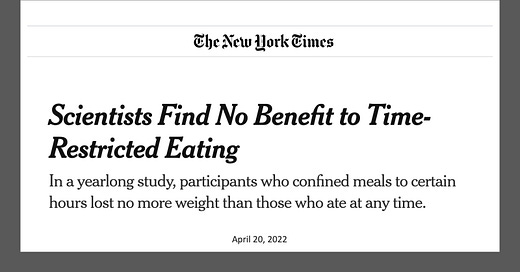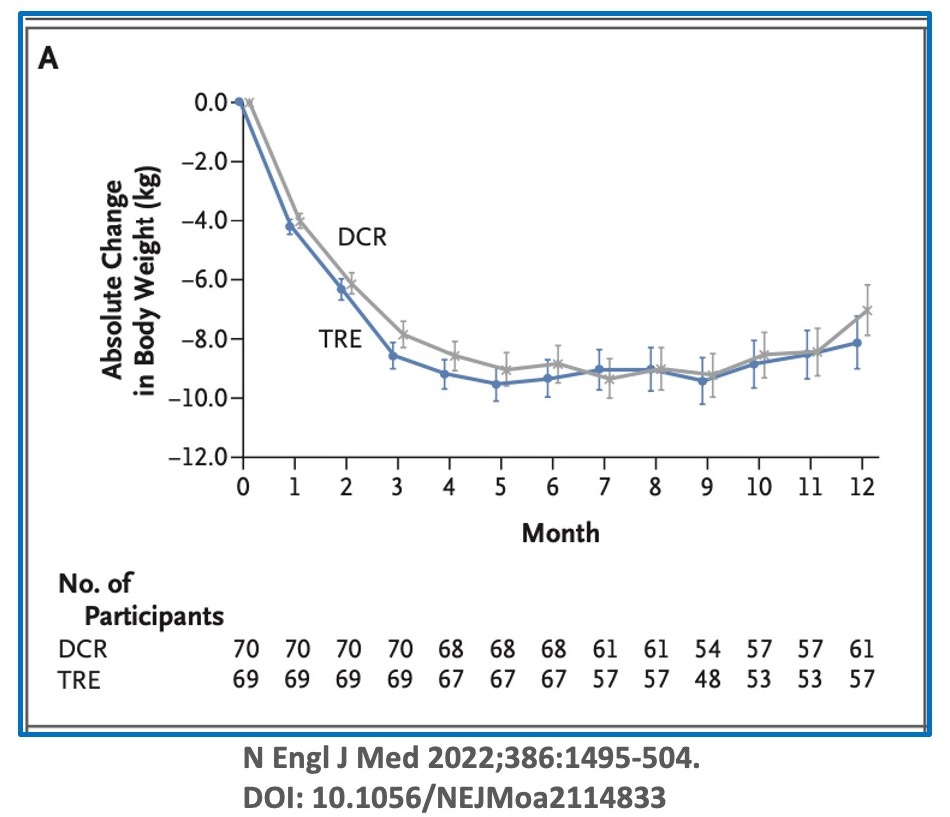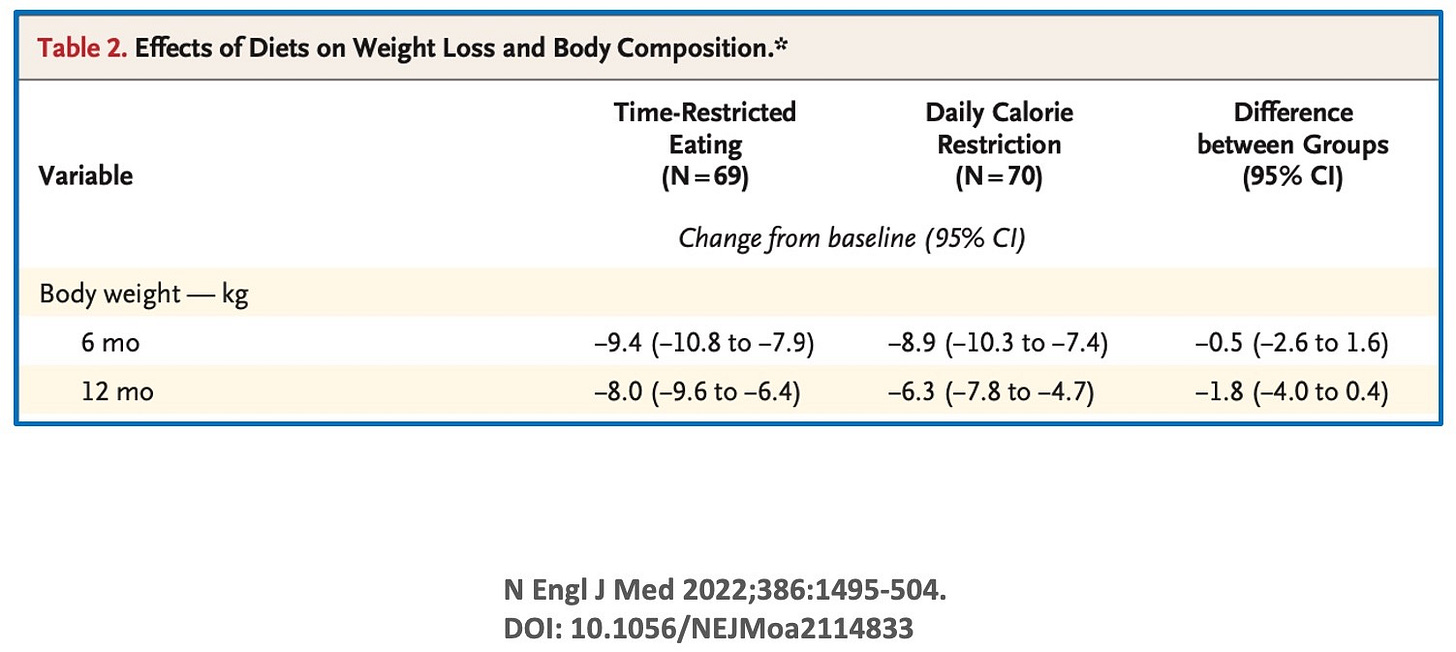The New York Times screamed “Scientists Find No Benefit to Time Restricted Eating” on April 22, 2022 citing a study published in the New England Journal of Medicine entitled “Calorie Restriction with or without Time Restricted Eating in Weight Loss”. Wow, that’s a bit of a surprise. You’d think that if you didn’t eat as often that you’d lose more weight, but here was proof. Scientists. Another fad diet proven fraudulent, right? Not quite.
Let’s dig into the details a little. 139 people were randomly assigned to one of two groups - calorie restricted diet (1200-1500 for women, 1500-1800 for men) alone or the same calorie restricted (CR) diet plus time restricted eating (TRE). In this case, this meant that you could only eat for 8 hours of the day, between 8:00 am - 4:00 pm. Did the additional restriction upon eating times increase weight loss?
Not exactly. At twelve months, the TRE group did indeed lose 1.8 kg (4 pounds) more weight but this was not statistically significant, so therefore cue the breathless headlines that ‘Fasting has NO benefits’.
But there’s a little more nuance to the story. There are three potential problems. underpowered. dependent, not independent variable. assumes that CR works.
Underpowered.
Whenever you have a trial that shows that something does not have any benefit, there is also the possibility that the study was simply underpowered. Were there enough participants to show the difference you were looking for? This requires a power calculation.
The researchers calculated that 138 participants are needed to show a 2.5 kg difference between the two groups. Is this a reasonable power calculation? Let’s run the numbers.
The control group had an eating window of 10.2 hours per day, which means they fasted for 13.8 hours. The TRE group ate over 8 hours a day and fasted for 16 hours. The increase in fasting time is 2.2 hours, or 16%. This is the intervention, which needed to cause an extra 2.5 kg (5.5 lbs) in weight loss.
The control group lost 6.3 kg over the 12 months of the study, which is, to put it into context, pretty darned good. These people weren’t all that heavy to begin with, at 88kg (194 lbs), so that was 7% weight loss. The researchers expected an additional 2.5 kg on top of the 6.3 kg, or an extra 40% weight loss.
Let’s recap:
A 16% increase in fasting time must increase weight loss by 40%, in order for this study to show a statistically significant result.
Otherwise, this study is negative. Not exactly realistic. Anybody with any kind of clinical experience treating obesity will know that this is completely unrealistic. This study is at least 100% underpowered. So why, exactly is anybody surprised at the negative result?
This study brought a knife to a gunfight. It is woefully underpowered to answer the question it was supposed to settle.
With underpowered studies, the next step is to see if there is any signal, any hint that TRE might be useful. We can use this for hypothesis generation only, since it is not proved.
The extra weight loss was 1.8 kg compared to a weight loss of the control group of 6.3 kg. That is 29% better than with TRE.
A 16% increase in fasting time increased weight loss by 29%.
At 6 months, the fasting group only had a slight 0.5 kg advantage. By 12 moths, this had widened to a 1.8 kg lead. That’s a 4 pound edge! Simply for cutting a couple of hours off your eating time. That’s pretty damned impressive. Not only that, but this study generates the hypothesis that the benefit increases over time. Sounds pretty good to me.
Let’s look at the other important outcomes, all of which were not statistically significant.
Waist circumference? TRE better
Body Fat Mass? TRE better
Body Fat %? TRE better
Visceral Fat? TRE better.
Ultimate vs Proximate Causes.
The other conclusion many people made from this study is that all the benefits of TRE derive from calorie restriction alone. Therefore TRE adds nothing. This is a fundamental misunderstanding of independent versus dependent variables and the problem of ultimate and proximate causes.
The study compared an intervention (CR) with that intervention and another (CR + TRE) to isolate the effect of the fasting. This is a great study design if these two interventions are independent. Let’s say we have intervention A and intervention B, and measure the result we’ll call C. In this situation, with A and B are independent of each other, and therefore, we can compare the two groups to see if A has an additional effect.
However, if A and B are dependent variables, or one causes the other, then the study design above doesn’t work. Let’s say that A causes B which affects result C. If we fix B, then C will be the same, whether A is present or not. Let me illustrate.
Suppose we have a leaky pipe which causes a puddle. I say that the leaking pipe (A) causes water accumulation (B) which results in a puddle (C). I say the problem is the leaky pipe. You say that “The pipe is irrelevant. The puddle accumulates simply due to the balance of Water In vs Water Out.”
To settle the issue, we design a randomized study. In one group, we fix the pipe, and in the other, we mop up the water to increase Water Out. In the first case, we fix the pipe (A) to release 500 ml less per day (B). In the second, we mop an extra 500 ml per day (B). When we measure the resulting puddle (C), we find they are exactly the same. Ergo, fixing the pipe is NOT useful, because it doesn’t improve results. This is obviously a ridiculous result, which occurs because of the wrong study design - one for independent variables, not dependent ones.
What is missing from this analysis is that the leaky pipe is the ultimate cause, and the extra water is only the proximate cause. Fixing the ultimate or root cause solves the problem, and fixing the proximate cause generally does not. There is more Water in vs Water Out BECAUSE the pipe is leaking. The two issues are not independent.
Let take another example. Suppose you are wondering why the pub is so busy. I say it’s Superbowl Sunday, and you say “That doesn’t matter. It’s just a matter of how many people enter vs. how many exit. It’s just People In vs People Out.” To settle the matter, we design a study. We check Superbowl (A) versus regular nights but limit the number of people entering to 10 (B). Measuring how busy the pub is (C), we find that it is the exactly the same.
This study concludes that “SuperBowl Sunday makes no difference to pub business. It’s all just People In vs People Out.” That, of course is ridiculous, being more people are entering the pub BECAUSE it is Superbowl. One causes the other. Superbowl is the ultimate cause, and People In vs People Out is the proximate cause.
Now, let’s return to the issue of time restricted eating and start with this statement. We know that many people are eating too much BECAUSE they are eating too often. We know this from other studies such as this one:
Reducing the eating window to 4 or 6 hours reduced caloric intake by about 500 calories without deliberate calorie counting. If your opportunity to eat only a few hours a day, you’ll likely eat less. The time you spend eating and the total amount you eat are not independent variables, and treating them as such will miss the key fact that for some people, this is the ultimate cause of why they are eating too much, and then gaining weight.
In this study, we compared time restricted eating (A) with calorie restriction alone (B) to only calorie restriction. But this study design does not investigate the independent effect of A, because these are dependent variables.
You can’t conclude that TRE has no additional benefits, just as you can’t conclude that fixing the pipe is not better than mops, or that SuperBowl Sunday has no effect on pub business.
Calorie Restriction Alone doesn’t work
What is the alternative to TRE? Just calorie restriction alone?
If there’s anything we know almost for certain, it’s that CR doesn’t work over the long term. It’s been the standard medical advice for at least 50 years, and the success rate is close to zero.
No Benefits?
Given the above concerns, I think that it is a massive overgeneralization to say that fasting has no benefits. Here are some important benefits.
TRE creates a structure to your eating day. Instead of the rule ‘eat whenever you want’, you have a rule ‘eat only between 8am and 6pm’ or whatever time interval you want to follow
TRE creates consistency by having the same eating window
TRE makes it easy to turn this into a habit. Consistency builds habits. Once it become habit to avoid late night eating, you no longer need to apply willpower to avoid late night eating, because this is the baseline
TRE is an easy way to lower calories. Here, you are restricting hours of eating, and it’s very easy to check what hours you are eating. Counting calories is very difficult because it’s an invisible quantity that you have no way of knowing.
TRE is free. It doesn’t cost money, it saves money.
TRE doesn’t take more time. It saves time.
TRE can be applied to any diet.
TRE simplifies your life. It doesn’t make life complicated, it makes it simpler.
TRE is easy for anybody to understand. The rules can be explained in 30 seconds.
TRE is a traditional way of eating, allowing time for the body to digest the food eaten. It's not a new-fangled fad, it’s the oldest eating rule in the book. DON’T EAT ALL THE TIME.
Against all these top 10 benefits of fasting, we can find these risks.
People don’t like it.
Importantly, the previous concern that fasting ‘burns muscle’ is put to rest in this study. It was not a concern. This makes sense from an evolutionary standpoint. We’d have to imagine that the human body is so completely stupid that it would store calories as body fat only to burn muscle when no food is available. The body stores calories as body fat and when there is no food, it uses body fat.
Conclusions
This study does not show that there are ‘no benefits’ to fasting or TRE as the headline would have you believe. Instead, the study is merely underpowered and designed to investigate independent variables instead of dependent ones. However, it also raises the hypothesis that fasting may indeed be more effective at weight loss, improve the durability of weight loss and improve visceral fat mass.












All I know is TRE and you have helped me lose 81 pounds and keep it off. For a 69 year old male I think it works well. Thanks many times over.
Thank you for immediate response to the New York Times article Dr Fung!
I have read your Obesity code book and it was eye opening.Many thanks from Greece!